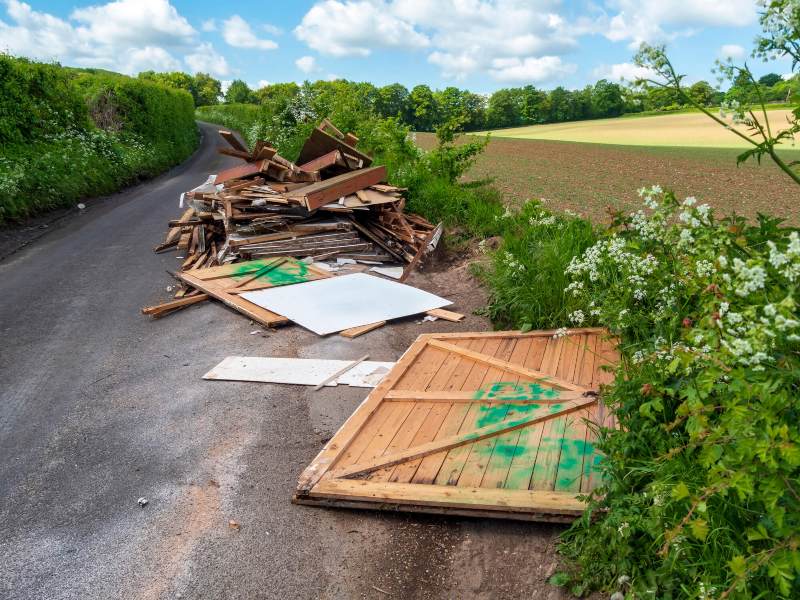If you travel the UK long enough, you’re sure to see it: heavy rubbish dumped in a ravine or along the side of a road. Of course, this trash didn’t get there on its own. This is most often the result of illegal dumping, also known as fly tipping. The House of Commons library defines fly tipping this way:
“Fly-tipping is the illegal disposal of household, industrial, commercial, or other ‘controlled’ waste. The waste can be liquid or solid; controlled waste includes garden refuse and larger domestic items such as fridges and mattresses. Fly-tipping is not the same as littering. Littering is commonly assumed to include materials, often associated with smoking, eating, and drinking.”
Every hour of every day, someone dumps garbage where it doesn’t belong, thinking it doesn’t matter. But it does matter. Here’s why.
Mounting Financial Costs
According to the BBC, over a million fly-tipping incidents were recorded in 2021, costing local authorities nearly £400m. These incidents surged by 16% in 2020–2021 compared to a year earlier, according to the Guardian. It’s gotten so bad that the government is “considering measures to make manufacturers of the most-dumped items – such as furniture and mattresses – responsible for the cost of disposing of waste created by their products.”
Human Health Concerns
Dumped trash often contains materials dangerous to human health. This can include used syringes, diapers, broken glass and rusty nails. It’s commendable that many citizens volunteer to clean up rubbish, but precautions should be taken, including gloves. If you see any waste that concerns you, you can opt to simply report the incident to local authorities who can dispose of it safely.
Pests
Rubbish dumped in urban areas attracts pests such as mice, rats and cockroaches. In addition to annoying city residents and workers, these animals can create unsanitary conditions and spread disease.
Spoiled Scenery
Fly tipping even occurs at some of the most beautiful locations in the United Kingdom, including national parks and historic sites. This can spoil the experience for visitors and give a bad impression of the UK to foreign travellers.
Environmental Damage
Many discarded materials can harm the environment. Toxic chemicals can seep into soil and waterways, posing risks to food and water sources, as well as wildlife. Animals can choke on or be poisoned by materials that seem like food.
Who Cleans It Up
In most cases, the job of investigating, clearing and taking appropriate enforcement action regarding small scale fly-tipping on public land falls on local authorities. In England, the Environment Agency handles larger-scale fly-tipping, hazardous waste, as well as fly-tipping done by organised gangs. If it occurs on private property, the landowner is usually expected to remove the waste, but local authorities and the Environment Agency have legal powers to enter the land and clear it. They may then seek compensation for related costs of the clean up process. Concerns have been raised about this sometimes-heavy burden placed on private landowners who are the victim of fly tippers.
Legal Penalties
According to the House of Commons library, “There is currently no minimum fine set out in law for unlawfully depositing waste under Section 33 of the Environmental Protection Act. Sentencing in individual cases is a matter for the independent courts. There are also a number of other possible penalties, including fixed penalty notices and having a vehicle seized. Householders can be fined up to £400 if they pass their waste to an unlicensed waste carrier which is subsequently fly-tipped.”
New Proposals
Government officials are discussing several options to curb fly tipping. This includes
● Making it free to bring materials to disposal centres
● Steeper penalties for fly tipping offences
● New tracking technology to track waste materials and nab fly tippers in the act
Proper Disposal
If you have materials that you want to dispose of the right way, call the professionals at Budget Waste Management. With over 23 years of growth and development, we’re proud to be one of the leading waste management companies in our area. With a modern growing fleet and an expanding, state-of-the-art recycling centre that is fully self-sufficient in electricity and water, we take waste from Worcestershire, Warwickshire and Gloucestershire and export all over the UK and Europe.
We are passionate about meeting new aims and recycling targets. Since ethos is to reduce and reuse, we sell a range of processed aggregates and soils from our recycling centre on the outskirts of the Cotswolds and Vale of Evesham. Supporting our community is at the heart of what we do, from working with local charities to skips for village clearances. We are always looking for ways to make a difference.
To book a skip, please contact our expert team today on 01386 841181, email sales@budgetskips.com or click here.

